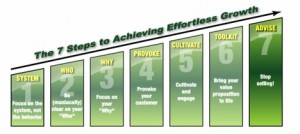How To Stop Overcoming Objections & Double Your Results
 Walk into any bookstore, or read any sales oriented magazine and you'll see the primary focus on strategy and skills is the ability to overcome objections. Last week, I was talking with a fellow executive that I’ve known since I began advising sales teams more than 20 years ago. I was sharing with him how the discoveries we’ve made in developing The 7 Steps to Achieving Effortless Growth have impacted the sales teams we work with.
Walk into any bookstore, or read any sales oriented magazine and you'll see the primary focus on strategy and skills is the ability to overcome objections. Last week, I was talking with a fellow executive that I’ve known since I began advising sales teams more than 20 years ago. I was sharing with him how the discoveries we’ve made in developing The 7 Steps to Achieving Effortless Growth have impacted the sales teams we work with.
A couple of days later, he emailed me asking how (or if) our advice has changed in terms of how salespeople overcome objections. As I shared his question with my VP, Sales & Coaching Programs, we realized that we haven’t had a conversation with a sales client about overcoming objections in years. I've learned that when you stop overcoming objections, selling becomes far more effortless and productivity accelerates.
It’s funny, because the ability to overcome objections used to be the peak of much of the sales training and coaching I provided. However, as the world has gotten increasingly complicated and competitive, if your customer/prospect is objecting it’s probably too late. Rather than overcoming, the key today is preventing objections.
To prevent objections, follow these five steps;
- Create a very clear Headpin Customer Profile™. When your customer focus is too broad, you have no choice but to define yourself by your product and that will increase the likelihood of objections, and the pressure on price.
- Develop a clear focus on why people should buy from you. Define the critical problems that you solve for your Headpin Customer™ better than anyone else does.
- Create a clear commercial teaching point-of-view that challenges and changes your Headpin Customers’ perspectives. Without a commercial teaching point-of-view, you can only focus on features and benefits, which increase the likelihood of objections.
- Develop a core list of resonating questions that cause your customers/prospects to learn about their objectives as much as they learn about your products/services.
- Engage. Be human and have genuine conversations. Preventing objections is more about managing communications than it is about manages sales.

.png)
.png)



